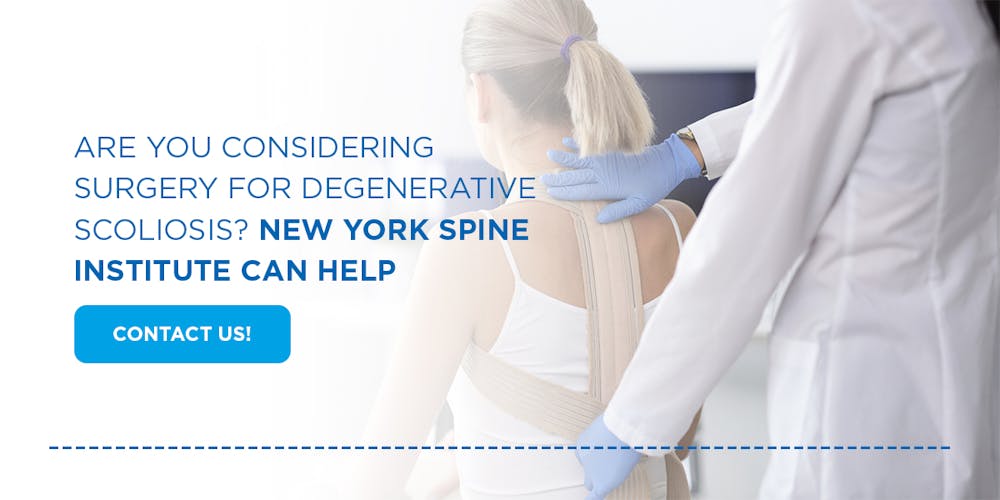Scoliosis is a curvature of the spine, and most people associate it with teens and children. However, when adults start developing back pain and have difficulty walking, adult-onset scoliosis, also known as degenerative scoliosis, can be the culprit. Fortunately, patients now have good options for addressing this condition.
What Is Degenerative Scoliosis?
Degenerative scoliosis happens when intervertebral discs and facet joints degenerate. Both of these parts of the spine are important, with facet joints allowing the spine to bend and intervertebral discs absorbing shock.
Over time, these parts of the spine degenerate for almost all people. However, for patients with degenerative scoliosis, the symptoms associated with degeneration are more severe or the deterioration itself can be faster and more significant than expected. The spine often develops a side-to-side curvature and patients can experience back discomfort and shooting pain in the legs that inhibits mobility.
What Is the Treatment for Degenerative Scoliosis?
Usually, degenerative scoliosis is treated when it causes pain, spine deformity or other issues. A surgeon can take a patient’s history, conduct a physical exam and run imaging tests to diagnose this condition and its severity. Mild cases can be treated with physical therapy, water therapy, pain management and epidural steroid injections. Applying ice and heat or getting manual manipulation from a qualified professional can also help.
Less commonly, braces can be used, or a surgeon may recommend weight loss to ensure less pressure is placed on the back.
When Degenerative Scoliosis Requires Surgery
In some cases, a surgeon will recommend degenerative scoliosis surgery. Factors that help determine this treatment include:
- Affected nerve or spinal roots: This condition may affect the nerve or spinal roots, resulting in loss of nerve function. When this happens, a patient can lose body functions, leading to incontinence or difficulty walking. Surgery can help keep nerve operation intact.
- Significant pain: In some cases, degenerative scoliosis surgery is recommended if pain management does not help. Surgery can assist with relieving discomfort so that patients can return to everyday life.
- Complications: Surgery can also help if the spinal curve is deep enough to cause complications, such as problems with balance and walking or increasing pain. While some patients are worried about the appearance of a deep spinal curve, surgery is not usually recommended unless the condition causes medical problems.
Are You Considering Surgery for Degenerative Scoliosis?
If you have degenerative scoliosis or suspect you may have it and are exploring your treatment options, New York Spine Institute (NYSI) may be able to help. We were founded in 2000 to support patients using the latest, high-quality musculoskeletal care in a compassionate and caring environment. Our team includes board-certified orthopedic surgeons, a board-certified neurosurgeon, pain management specialists, sports medicine specialists and other professionals.
Learn more about us or contact us today to schedule an appointment.

